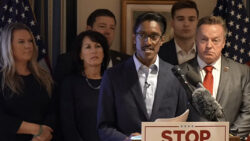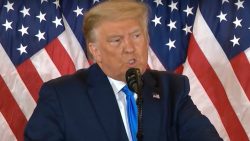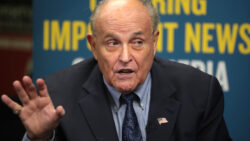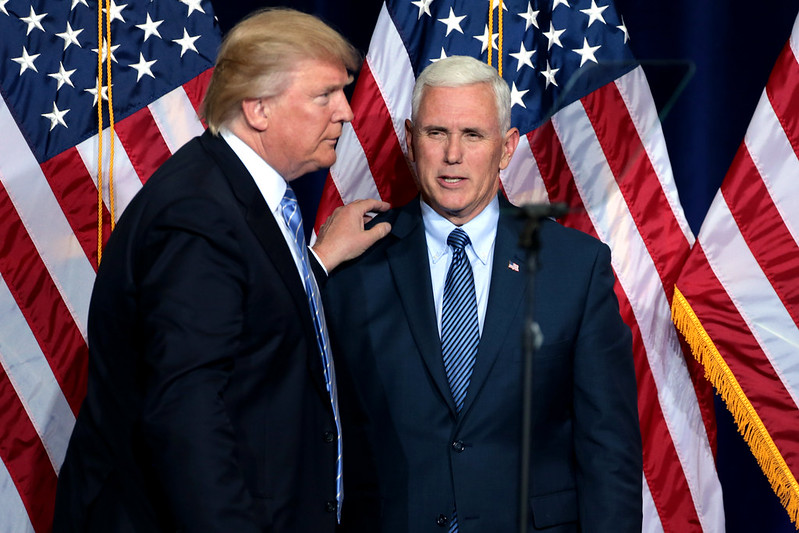
The House select committee investigating the Jan. 6 attack on the U.S. Capitol held its third public hearing Thursday. Investigators said that Trump and his allies pursued an unlawful plan to have former Vice President Mike Pence overturn the 2020 election—and that Trump knowingly put Pence in danger when he refused to do so.
Select committee vice chair Rep. Liz Cheney said that the committee is outlining a seven-part plot by Trump and his allies to overturn the will of the voters. Last week, the committee looked at the violence committed on Jan. 6 and the efforts by extremist groups like the Proud Boys and the Oath Keepers to overturn the election. On Monday, the committee brought forth evidence that Trump knew his stolen-election claims were false and perpetuated them among his followers anyway.
In Thursday’s hearing, investigators examined the role of John Eastman, a lawyer who provided Trump with the false legal theory that the vice president, who presides over the counting of the electoral votes in a ceremonial capacity, had the authority to either: declare a 10-day recess and send electoral votes back to the states, or outright reject the electors and essentially declare Trump president. Trump wanted Pence to reject the electors outright when Congress certified electoral votes on Jan. 6. Pence refused to bow to the pressure.
Here are the five main takeaways from the hearing.
Trump lawyer John Eastman peddled a theory that the vice president could have the authority to overturn the election. He knew his theory was false.
Eastman is known as the author of the “coup memo.” A lawyer with the ultraconservative Claremont Institute, he wrote a series of memos laying out an alternative reading of the 12th Amendment in which the vice president had the authority to overturn the presidential election.
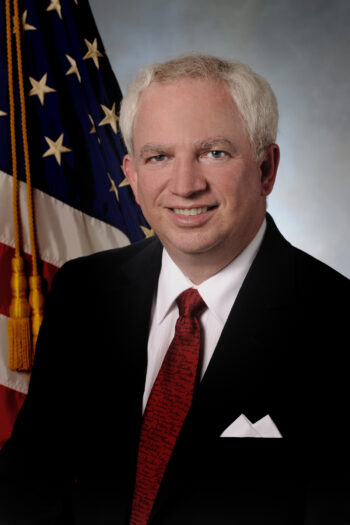
Testifying to the committee Thursday, Greg Jacob, Pence’s chief counsel, recalled a conversation he had with Eastman before on Jan. 5. “Part of my discussion with Mr. Eastman was, if you were right, don’t you think Al Gore might have liked to have known in 2000 that he had authority to just declare himself president of the United States?” Jacob said. “And of course, he acknowledged Al Gore did not and should not have had that authority at that point in time.”
But that didn’t stop Eastman from encouraging Pence to follow the plan. According to Jacob, Eastman told him in that conversation, “Al Gore did not have a reason to do it in 2000, Kamala Harris shouldn’t be able to do it in 2024, but I think you should do it today.”
Jacob also said Eastman acknowledged that if they followed the plan it would go to the Supreme Court and likely lose 9-0.
Eastman knew this theory had no legal basis. The House select committee got its hands on a draft letter to the president from October 2020 in which this false legal theory was proposed. Editing the letter was John Eastman, who eviscerated the argument. Eastman wrote in track changes, “The 12th Amendment only says that the President of the Senate opens the ballots in the joint session. … nowhere does it suggest that the President of the Senate gets to make the determination on his own.”
Adviser after adviser after constitutional expert said Mike Pence had no authority to overturn the election.
Judge J. Michael Luttig, a retired federal judge and conservative constitutional expert, told the select committee Thursday, “there was no basis in the Constitution or laws of the United States at all for the theory espoused by Mr. Eastman at all.” Luttig, who once employed Eastman as a clerk, had advised Pence against following Trump’s order to overturn the election.
After Trump began pressuring Pence to overturn the election, Pence’s legal team examined the claim from all angles. Their conclusion? “There is no justifiable basis to conclude that the Vice President has that kind of authority,” Jacob told the committee.
That opinion was shared by others in the Trump White House. Jason Miller said that Trump White House counsel “Pat Cipollone thought the idea was—was nutty, and had at one point confronted Eastman basically with the same sentiment.”
White House counsel Eric Herschmann was blunt with Eastman. “Are you out of your f-ing mind?’” Herschman says he asked Eastman. “You’re going to turn around and tell 78-plus million people in this country that your theory is, this is how you’re going to invalidate their votes, because you think the election was stolen?”
Trump launched a public pressure campaign on Pence despite being told repeatedly his plan to overturn the election was unconstitutional.
Despite his White House counsel and Pence’s legal team finding the plot unconstitutional, Trump launched a public pressure campaign on Pence.
He tweeted repeatedly ahead of Jan. 6 that Pence needed to come through for the American people and have the “courage” to overturn the election results.
While the public pressure campaign raged on, Trump began pressuring Pence in private meetings. During a meeting on Jan. 4 between Trump, John Eastman, Pence, Marc Short, the chief of staff to the vice president, and Jacob, Eastman floated his theory again. The vice president “never budged from the position” and did not agree with Eastman, Jacob said.
On the morning of Jan. 6, Trump called Pence. Those who overheard the president said he became increasingly angered and that he called Pence a “wimp.”
During an email exchange between Jacob and Eastman on Jan. 6, Jacob asked if Eastman had advised “the President that in your professional judgment, the Vice President does not have the power to decide things unilaterally?”
“He’s been so advised,” Eastman replied. “But you know him. Once he gets something in his head, it’s hard to get him to change course.”
Trump put Pence in danger.
After his call with Pence, Trump was upset with his vice president for refusing to go along with his unconstitutional plan. He let the crowd on the Ellipse know it, too.
“And Mike Pence is going to have to come through for us, and if he doesn’t, that will be a sad day for our country. Because you’re sworn to uphold our Constitution,” Trump told the crowd.
When the mob stormed the Capitol, chants broke out of “Hang Mike Pence!” Reporting by the New York Times revealed that Trump’s chief of staff Mark Meadows, “according to an account provided to the House committee investigating Jan. 6, then told the colleagues that Mr. Trump had said something to the effect of, maybe Mr. Pence should be hanged.”
Trump knew Pence was in danger and was aware that the Secret Service had escorted him away from the legislative chambers. Rather than send a tweet to call off the mob, he sent another criticizing Pence, effectively “pouring gasoline on the fire,” as one staffer described it.
“Mike Pence didn’t have the courage to do what should have been done to protect our Country and our Constitution,” Trump tweeted at 2:24 p.m.
Pence and his team came within 40 feet of the mob as the Secret Service took him to a secure location, according to investigators’ findings. He and his team bunkered there for more than four and a half hours until they could return to legislative chambers to finish counting.
During and after the attack on the Capitol, Eastman continued to advocate his plan to overturn the election even though he knew his plot was criminal.
As the mob attacked the Capitol, Jacob emailed Eastman. “Thanks to your bulls**t, we are now under siege,” he told Eastman.
Eastman replied by saying, “the siege is because you and your boss [the VP] did not do what was necessary.”
But Eastman wasn’t done. He again implored Jacob “to consider one more relatively minor violation and adjourn for ten days to allow the legislatures to finish their investigations.”
After the riot, Herschmann said Eastman called him about challenging the election results in Georgia.
“And I said to him, ‘Are you out of your f-ing mind?” Herschmann told the committee. “‘Now I’m going to give you the best free legal advice you’re ever getting in your life. Get a great f-ing criminal defense lawyer. You’re going to need it.’”
Eastman apparently thought his actions were criminal, too. He emailed Rudy Giuliani seeking a pardon. “I’ve decided I should be on the pardon list, if that’s still in the works,” he wrote.
The next hearing is scheduled for Tuesday, June 21, at 1 p.m. ET.




